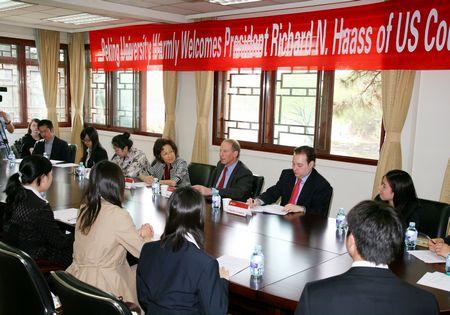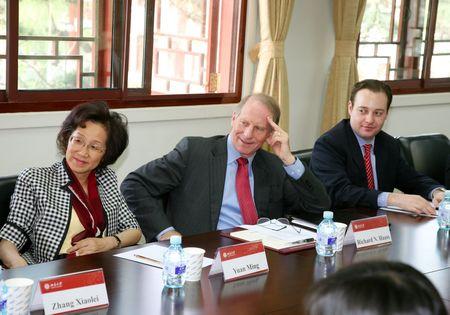Peking University, Beijing, May 12, 2010: On the morning of May 10, the United States Council of Foreign Relations President and renowned strategist Richard Haass gave a lecture at Peking University's Parkard International Faculty Residence lecture hall. The lecture was presided by PKU School of International Relations Vice Dean and Director of the Center for International and Strategic Studies, Professor Yuan Ming.

Mr. Haass used a news article he read in the morning to foreshadow the theme of the lecture "To Build a New World Order". He said that as far back as when he was still working at the White House, former President George H.W. Bush mentioned "New Order," but even until today, he still wonders what "New Order" means, what it includes, and what are the rules for dealing with international affairs in this "New Order"?
During his interaction with the students, Mr. Haass talked about his knowledge of handling international relations. He pointed out that every country would put their best interests first. Different countries have different interests and needs, and thus conflicts and disagreements are inevitable. "Countries need to take into account a broader picture of the present and the future, not just what is happening within their own territories," he continued.
Then, how do we solve the conflicts between countries? Mr. Haass believes that nations should learn from each other, "the U.S. is too uptight about the pace and liveliness of the economic development of other nations. Instead, the U.S. should adjust its own pace and set a more appropriate and realistic goal." When talking about the "New Order" in details, Haass believes that the U.S. can do two things during the reconstruction of the world order: one is to prevent wars between other countries, and the other is to encourage other countries to join the global economy. Mr. Haass also thinks the correct goal of U.S. foreign policies should be to encourage a multi-polar structure with cooperation and coordination instead of competition and conflicts.
Mr. Haass also mentioned the question of how to balance the relationship between short term and long term benefits within a nation, while also providing a unique perspective: "Not only do countries have the right to intervene, but also does every citizen." Thus, when a nation and its government are trying to solve an issue, they should consider the interests of others as well.
During this lecture, Mr. Haass also expressed his hopes for today's college students: "knowledge is updated very fast nowadays no matter what is your major, you must remember, the key is learning how to learn how to critically think and how to express your thoughts better."

Background Information:
Richard N. Haass, born in Brooklyn, NY in 1951, received his bachelor's degree at Oberlin College and afterwards attended Oxford University for his master's and Ph.D. degrees. From 1979 to 1980, he was employed by the U.S. Department of Defense and later by the Department of State for the next 5 years. From 1989 to 1993, he was appointed as Special Assistant to former President George H.W. Bush, while also serving as the Senior Director for the National Security Council for Near East and South Asian Affairs. In 1991, Haass received the Presidential Citizens Medal for his contributions in making and explaining U.S. policies during Operation Desert Shield and Operation Desert Storm. From 2001 to 2003, he was appointed as Director of Policy Planning for the United States Department of State and the principal consultant to then Secretary of State Colin Powell. Up until today, he has been the president of the U.S. foreign policy think tank - the Council of Foreign Relations.
Edited by: Seren
Translated by: An Jiang
Source: PKU News (Chinese)
Related News
Photos
More>>history
- Conference of China and the World Economy: Crisis, Adjustment and Mutual
- Strategic Alliance Agreement Signed by PKU College of Engineering and Schneider
- Premiere of "Yanyuan Liuyun: International Students of PKU at the World Stage"
- Cooperation Between PKU School of Stomatology and Rochester
- 60th Anniversary of PRC's Admission of International Students Celebrated at PKU





